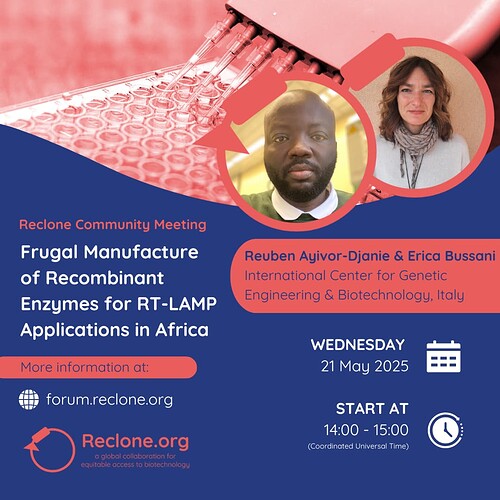Hello Reclone Community ![]()
You’re all invited to our Community Meeting next week, on 2025-05-21T14:00:00Z. We will hear from @Reuben Ayivor-Djanie and Erica Bussani, presenting about “Frugal Manufacture of Recombinant Enzymes for RT-LAMP Applications in Africa”.
Manufacturing of reagents for nucleic acid tests is limited in Africa. This leads to a dependency on imports of molecular biology reagents for research, innovation and clinical applications, creating scarcity of critical reagents for research and diagnostic purposes during high global demand, as demonstrated during the COVID-19 pandemic. The need to empower local laboratories for sustainable local manufacturing of reagents for nucleic acid tests cannot be overemphasized.
In this talk we discuss a two-prong approach we used in a bid to establish a protocol for the local production of enzymes for RT-LAMP in low resource settings. First, we replicated the cellular reagent protocol established by the Dr. Andrew Ellington lab at the University of Texas, Austin. Briefly, we transformed an engineered Bst DNA polymerase with both reverse transcriptase and polymerase activity, Br512 mut235, into BL21(DE3) E. coli cells and induced expression under a T7 promoter with IPTG. After induction, cells were dried overnight at 37oC on silica desiccant. We then performed a LAMP-OSD Assay for the SARS-CoV-2 detection in RNA samples, using the dried cellular reagents as source of enzyme. Erica presents the results from these assays, performed in ICGEB and in two African partner labs after the transfer of the technology.
Although cellular reagents reduce the costs, time and logistical demands of making reagents for nucleic acid test in resource limited areas, results may not be reproducible, and troubleshooting is challenging. Hence, we sought to develop a cheap, sustainable and easy-to-replicate protocol for the purification of enzymes for RT-LAMP. We produced Fe3O4-SiO2 magnetic nanoparticles and functionalized them with R5-SAVSBPM32, using cell lysates from R5-SAVSBPM32 expressing BL21 (DE3) E. coli cells. This allowed for the purification of streptavidin binding peptide SBP(A18C)-tagged recombinant mCherryM10Q-Br512mut235 fusion protein to be purified using biotin as an exchange molecule. The activity of the enzyme was tested in RT-LAMP assays.
Here provided is a novel proof-of-concept for a low-cost protein purification protocol using in-house manufactured magnetic affinity matrices from non-hazardous starting materials. Future technical work will be focused on streamlining quality control and assurance processes for diagnostic manufacturing, demonstration of clinical performance and extension to PCR and other NATs.
![]() Join us via Zoom: Launch Meeting - Zoom
Join us via Zoom: Launch Meeting - Zoom
Feel free to invite and share news to others in your networks who might be interested ![]()
You can also check our previous meetings at Events – Reagent Collaboration Network or via the Reclone YouTube channel.
Likewise, you can see the Upcoming Events on the Reclone Calendar, tell us you’re Interested/Going, and add these to your own calendar.
See you all at this meeting!
